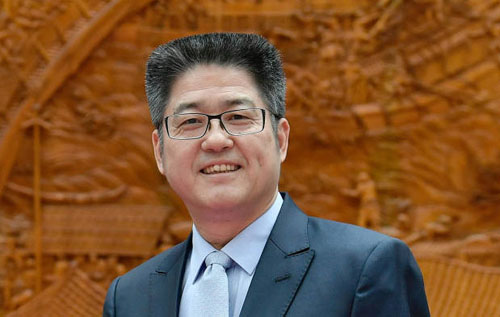Belt and Road
Your Present Location: PROGRAMS> Belt and RoadFT interview with Chinese vice-minister for foreign affairs on China’s vision for BRI
Source: Financial Times Published: 2018-9-26
Vice-minister Le Yucheng rejects criticism, says China is providing much-needed infrastructure
Five years after Chinese President Xi Jinping launched the Belt and Road Initiative on a visit to Kazakhstan, the plan to rebuild the ancient silk road connecting China and Europe has become his signature foreign policy.

But for something so monumental, so important to the Chinese leadership and so potentially controversial abroad, it is often hard to find solid and specific information on the project.
Critics have described the plan as neocolonialism, as a strategic ploy to enhance China’s military power outside its borders or as a plot to ensnare countries in debt traps that eventually force them to hand over territory and strategic assets.
In a rare high-level interview on the topic, Le Yucheng, Chinese vice-minister for foreign affairs, has spoken at length to the Financial Times about China’s vision for the BRI.
Unsurprisingly, Mr Le, a Eurasian specialist and former Chinese ambassador to Kazakhstan and India, rejects all these criticisms out of hand.
“Some media reports say China has created traps for certain countries,” he says. “We find it unacceptable because we have made a lot of contributions to those countries.”
He points out that the primary focus of the BRI is to build much-needed infrastructure in places where such investment has long been neglected.
“We Chinese often say that if you want to get rich, build roads first. Africa has for many years received certain assistance from western countries but why couldn’t it achieve faster development? One important reason is the under development of infrastructure,” he says.
The experience of Sri Lanka, which handed over operation of the Chinese-built Hambantota port to a Chinese-controlled company late last year, is often cited as an example of a country that has fallen into a debt trap. But Mr Le draws attention to the fact that only about 10 per cent of Sri Lanka’s external debt of just over $50bn is owed to China and about 60 per cent of the loans from China were at lower than market interest rates.
“We also advise host countries [of BRI projects] to act within their means and not to overstretch,” he says. “Some countries may face difficulties in repaying the debt . . .[but] we will not press down hard on them. When they encounter difficulties, normally we will . . . take flexible measures.”
Mr Le rejects the suggestion there is a military element to BRI. “We have no intention of using the security of BRI to set up overseas military bases,” he said. “We pursue an independent foreign policy of peace and a defence policy that is defensive in nature and I want to point out that China’s military presence overseas is much smaller than other major countries.”
He explicitly contrasts the intentions of the BRI with those of the post-second world war Marshall Plan, which he described as having “clear geopolitical and ideological objectives”. In contrast, “the BRI is an initiative for international economic co-operation and connectivity co-operation”, he says.
So far, more than 130 countries have signed agreements or memoranda of understanding with China on the BRI, even though China’s initial plan involved only a few dozen countries that straddle the trade routes between China and Europe. “Many countries see the BRI as an opportunity and a platform for closer co-operation with China,” Mr Le says. “The BRI has been warmly welcomed to an extent that has far exceeded our expectations.”
Some countries have begun to establish alternatives to compete with the BRI. While it remains in the conceptual stages, the US, Japan and India have outlined a vision of “Indo-Pacific” co-operation that seems at least partly targeted at countering the BRI proposals.
“We are open to all initiatives that will help regional development and co-operation but what we are against is attempts to use the Indo-Pacific strategy as a tool to counter the BRI or even to contain China,” Mr Le says. “We hope to see all parties working in concert instead of undercutting each other’s efforts.”
For a country that ranks about 70th in terms of per capita gross domestic product, the scale of China’s BRI ambition is breathtaking. It has also led to muttering within China that Beijing is squandering the nation’s wealth on helping other countries.
“We do face the daunting challenge of inadequate and unbalanced development [inside China] but I don’t think it is too early to pursue external co-operation at this point,” Mr Le says. “In today’s world we see a trend of rising protectionism, unilateralism, bullying and anti-globalisation. [In contrast, the BRI is an] effort to build a more fair and equitable international order and to reform the global economic governance structure.”























































































 京公网安备 11010802037854号
京公网安备 11010802037854号





